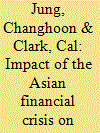| Srl | Item |
| 1 |
ID:
059168


|
|
|
| 2 |
ID:
096155


|
|
|
|
|
| Publication |
2010.
|
| Summary/Abstract |
The Republic of Korea was one of the major victims of the Asian Financial Crisis of 1997-98, but it recovered its economic dynamism quite quickly. In the short term, its budgetary response to near economic collapse was immediate and quite significant. The government increased spending and, once the peak of the crisis was over, taxes and expanded its previously very limited support of needy Koreans by substantially increasing funds for social development and for aiding local government. Thus, despite its being forced to accept a large International Monetary Fund (IMF) loan in late 1997, Korea clearly rejected the IMF model of fiscal austerity and governmental downsizing, giving a much higher priority to the welfare of its citizens. However, this short-term response to the devastating fallout from the crisis seems to have exacerbated several long-term challenges facing Korea. The liberal fiscal policy clearly contributed to the country's burgeoning debt problem, and there have been only limited attempts to improve the problems associated with public funds and special accounts. Unfortunately, political inertia makes a serious response to these long-term challenges unlikely in the near future.
|
|
|
|
|
|
|
|
|
|
|
|
|
|
|
|
| 3 |
ID:
079683


|
|
|
|
|
| Publication |
2007.
|
| Summary/Abstract |
This article draws attention to the ideological role that the neoliberal discourse on corruption has fulfilled in the promotion of the second generation reforms in Southern countries since the 1997 East Asian financial crisis. This discourse is ahistoric insofar as it fails to recognise corruption as a problem of modernity; biased insofar as it associates corruption with Southern countries' historical and cultural specificities only; contradictory in terms of its counter-productive anti-corruption strategies; and politicised as it has redefined 'corruption' as 'rent-seeking'. In the absence of alternative radical conceptualisations, this essentially competition-induced neoliberal orthodoxy on corruption has been easily articulated within morality-based popular concerns in domestic politics and hence acquired a hegemonic capability. The article substantiates these arguments by examining the trajectory of the neoliberal anti-corruption agenda in Turkey with a particular focus on the developments of the post-2001 financial crisis period
|
|
|
|
|
|
|
|
|
|
|
|
|
|
|
|